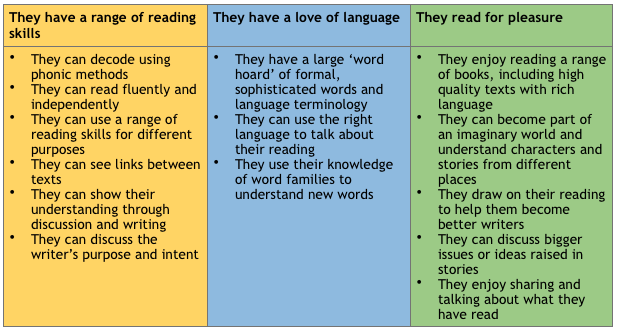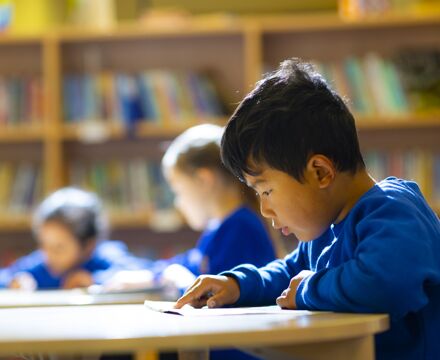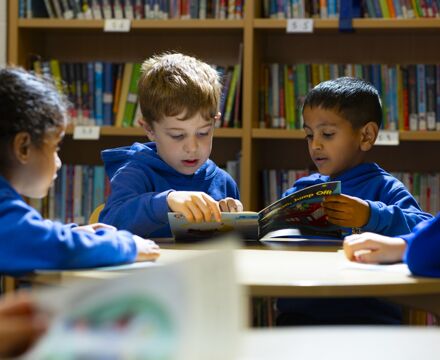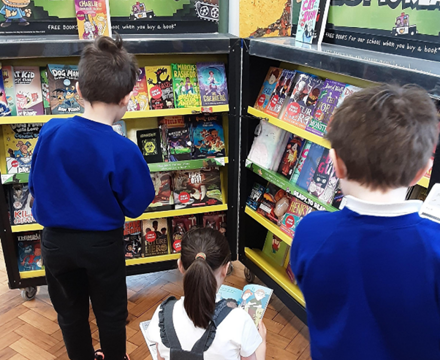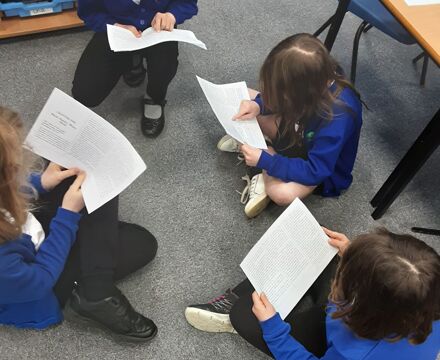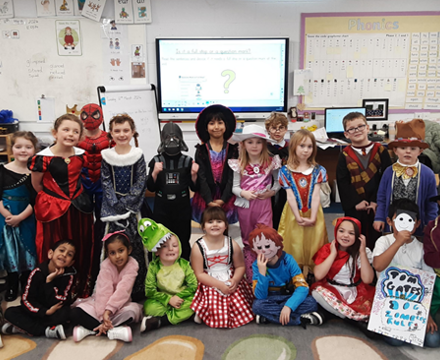- Home
- Curriculum
- English - Reading
English - Reading
We believe that reading is the key to success in the future.
Intent
We want our pupils to have the skills to access reading in all areas of the curriculum, and to take away a love of reading when they leave us. We want them to be readers for life!
To do this we aim to…
- Ensure that pupils are exposed to a range of texts which means they become fluent and accurate in reading across a variety of genres and styles.
- Ensure that explicit teaching of reading skills and strategies to support pupils in accessing all subject areas and understanding the world around them.
- Promote a love of reading: through books as doors and mirrors, pupils connect with the world and peoples around them, and learn about themselves.
- Develop pupils’ vocabulary and a love of language to help pupils to access a range of texts.
- Develop a consistent approach to teaching reading in order to close gaps and ensure that all children leave in year 6 being able to read.
Our school and classrooms are places where we encourage a rich and varied access to language to support reading and writing skills. We aim to create a culture in our school which encourages a love of reading to engage and inspire pupils to want to succeed.
What does a ‘reader for life’ look like?
Implementation
We believe that the acquisition of the phonetic code, fluency and proficient comprehension as an entitlement for all children has the power to transform lives; it enables them to access the whole curriculum and engage more fully with the world around them. We ensure as many opportunities as possible during the school day to read, enjoy, share and discuss books.
Learning to Read
We follow a systematic approach to teaching phonics, using the Little Wandle Letters and Sounds Revised programme. The teaching of phonics begins in Reception, and teaching continues daily to at least the point where children can read almost all words fluently. This provides children with the skills they need to begin to read words, captions and whole sentences as soon as possible.
Focused reading practice: In Reception and Year 1, children practise reading using Little Wandle Big Cat decodable books that are closely matched to their developing phonic knowledge. Our children often reread the same text multiple times to develop their comprehension and fluency which includes their accuracy, automaticity (rapid recall of whole known words) and prosody (reading with expression).
Daily Reading practice: Pupils in all classes have opportunities to read daily: in reading groups in EYFS and KS1, whole class reading, or independent reading in KS2. Pupils also have opportunities to read in other subjects across the curriculum. Pupils who are less fluent will read regularly 1:1, with a focus on the lowest 20%.
Support to Keep up and Catch up: Until pupils are fluent readers, ‘Keep up’ sessions are used for pupils who teachers identify in on-going assessment as needing more support in consolidating their phonics knowledge. KS2 pupils who need more support in developing their reading skills receive intervention on an individual or small group basis if they are identified from assessment papers as needing support in addition to whole class reading.
Access to appropriate books: We recognize the importance of reading at home to practice and embed reading skills. Pupils in R/Yr1/Yr2 take home their Little Wandle book and a sharing book to enjoy with a grown up. Pupils in KS1 who are not fluent remain on LW books until ready to move onto pleasure for reading books.From Year 2 to Year 6, our more fluent readers use our extensive library that will encourage and enhance their love of reading.
Support at home: Pupils all have a reading record to keep track of their reading. Children are expected to read for a minimum of 20 mins of independent reading at school and are encouraged to read at home for 20mins a day.
Resource Base
In our Resource Base, the adults individualise the children’s reading programme depending on their ability. Children read with an adult daily. They practice their comprehension, retrieval, inference, deduction and decoding skills in small group sessions, with the use of individualised 2 minute reading challenges, topic texts and quality texts. In addition to this, children who are unable to use phonics to decode are supported with a programme such as Toe by Toe to aid sight reading. Children have the opportunity daily to free read and discuss texts with their peers and read to each other.
Reading for meaning
Explicit teaching of reading skills and strategies:
In EYFS and Yr1, pupils practise comprehension as part of the their reading practice. As soon as children master the alphabetic code and can read fluently in Year 2, we begin to use a whole class guided reading model. Reading lessons are three times a week for 30 -40 minutes.
Texts and extracts which are engaging to develop a range of reading skills:
In reading lessons, pupils use the class readers, CGP comprehension books, non-fiction, and poetry texts to learn and apply reading strategies. Across a fortnight, pupils have 4 lessons on fiction/non-fiction/poetry, and 4 exploring strategies for comprehension.
Each lesson is structured to ensure pupils can access the vocabulary in the text. In strategy lessons, teachers guide pupils through ways to make meaning from the text, and model how to demonstrate their learning. In text study lessons, pupils apply their understanding of strategies to explore ideas in the texts, such as character, setting, narrative, or genre.
Teachers use close, extended, or fluency reading approaches to ensure pupils have the chance to really explore the text, and practice fluency to aid comprehension. Pupils work in mixed ability reading pairs, carefully planned to ensure that pupils have peer support. Pupils demonstrate their learning through a mixture of discussions, creative and written responses.
Teachers assess daily through questioning and providing feedback orally, and through monitoring the quality of pupils’ responses. NFER tests are used for formal summative assessments three times a year and analysed to identify gaps in pupils’ understanding.
Love of reading
Access to quality texts: The schools’ extensive library ensures pupils have access to a range of relevant, diverse and engaging texts.
Allocated time for independent reading: Pupils may start the day with independent reading, and they are expected to have a reading book on their desk during the day.
Daily story time and reading together: Story time happens in every class, to ensure the children are read to everyday and share, discuss and enjoy the endless possibilities of books.
At The Avenue, we don’t just want our children to learn to read. We want them to LOVE reading and develop the desire to want to read for themselves. We encourage this by:
- Reading to children every day. We choose these books carefully as we want children to experience a wide range of books, including books that reflect the children at our school and our local community as well as books that open windows into other worlds and cultures.
- Having a wide range of quality reading books in our school.
- Teaching them how to appropriately use the library and to choose a book. They are encourage to use the '5-finger rule' meaning they read the first page and see if they can fluently read it without making 5 errors - a teacher will support with this.
- In Early Years, children have access to the reading corner every day in their free flow time and the books are continually refreshed.
- All staff demonstrating their own love of reading and by teachers selecting and recommending quality texts that the children will love.
- Encouraging all children from Reception to Year 6 choose a reading book to take home and this reading book is changed weekly.
- Children from Reception onwards have a home reading record. The parent/carer records comments to share with the adults in school and the adults will write in this on a regular basis to ensure communication between home and school.
- As the children progress through the school, they are encouraged to write their own comments and keep a list of the books/authors that they have read.
- Once a child has finished a book, they complete some activities linked to their book to show their understanding.
- Giving opportunities for the children to apply their reading skills across the curriculum.
- Children across the school have regular opportunities to engage with a wide range of Reading for Pleasure events - we plan annual author visits and workshops to inspire the children and celebrate World Book Day.
- Promoting books through displays.
- Each term, the classes will do a 'book chat' which is an opportunity to discuss books that they have read and is a time for teachers to offer recommendations.
- Involving children in the selection of new books purchased for our library.
- Each class visits the local library during the course of the school year.
- The school library is made available for classes to use.
Impact
The impact of our reading curriculum at The Avenue Primary School is to ensure not only that children reach the age-related expectations set out by the English National Curriculum, but also to equip them with skills that support and enable them to make maximum progress from their starting points.
- Pupils can read and make sense of a variety of texts – not only evidenced in NFER assessments, but in their readiness for transitions to the next stage of their education.
- Children can read for meaning in other subject areas, and as a result their understanding of the world is enhanced.
- By engaging with high quality texts, children read with enthusiasm and enjoy talking about their reading.
- Pupils have an increased ‘word hoard’ which they can apply to help them make sense of texts across the curriculum; with an appreciation for a writer’s use of language.
- We aim for pupils to achieve the age-related expectations for reading, and those that find reading challenging are targeted for intervention to catch up and make progress.
Through our rigorous and highly effective teaching of systematic phonics and approach to teaching reading, our children transitioning into secondary school will leave us as a fluent, confident and able readers, who can access a range of texts for pleasure and enjoyment, as well as use their reading skills to unlock learning across all areas of the curriculum. They will make at least good progress during their time with us and this will be monitored closely as they journey through the school. The impact of our reading curriculum will be measured by assessment procedures, which allow us to measure outcomes against all schools nationally.
- EYFS % of pupils achieving a ‘Good level of development’ (GLD)
- Phonics Screening Test at the end of Year 1
- End of KS1 % of children working towards the Expected Standard, at the Expected Standard or at Greater Depth in reading
- End of KS2 % of children working towards the Expected Standard, at the Expected Standard or at Greater Depth in reading
We firmly believe that reading is the key to all learning and so the impact of our reading curriculum goes beyond the results of the statutory assessments. Above all, impact will be measured by how effectively it helps our children develop into well-rounded individuals who carry with them the reading knowledge, skills and attitudes which will make them lifelong learners who are ready for the next stage of their education.
Downloads
| Page Downloads |
|---|
| The Avenue Book Spine |
| Reading |
|---|
| Reading overview for website |



